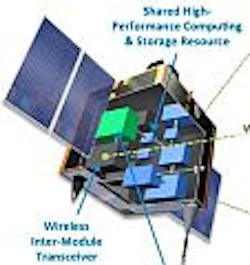DARPA moves ahead with fractionated-satellite System F6 program with solicitation for affordable satellite bus
ARLINGTON, Va. 20 May 2012. Satellite designers at the U.S. Defense Advanced Research Projects Agency (DARPA) are pushing forward with a project to develop fractionated satellites -- or small, networked clusters or orbiting satellite modules -- that are maintainable and upgradeable to replace traditional monolithic military satellites that can be risky and difficult to fix or upgrade when onboard malfunctions occur.
DARPA officials earlier this month announced their intention to pay for developing satellite buses for the Future, Fast, Flexible, Fractionated, Free-Flying Spacecraft United by Information Exchange demonstration program -- better-known as System F6. A satellite bus is the actual spacecraft that hosts satellite payloads.
DARPA issued a broad agency announcement (DARPA-BAA-12-32) on May 10 to pay for not only the System F6 satellite bus, but also to host the F6 technology package, and inter-satellite communications crosslinks on each bus, provide additional payloads to be shared across the cluster network on some of the buses, and support for integration and on-orbit demonstrations.
The System F6 program seeks to develop the enabling technologies for fractionated spacecraft, which consist of small, individually launched, wirelessly networked, and cluster-flown spacecraft modules designed to replace large, monolithic satellites.
The solicitation issued this month calls for building four affordable System F6 spacecraft, each able to host or provide a shared-resource payload for a six-month demonstration mission to launch in early to mid-2015.
Fractionated spacecraft are expected to share resources over a network with real-time, multi-level security, and fault tolerance. This kind of satellite architecture has the potential to enhance orbiting satellite adaptability and survivability, while shortening development time.
The System F6 program has three parts: the F6 developer’s kit (FDK), the F6 tech package (F6TP), and the F6 on-orbit demonstration testbed. The FDK consists of standard interfaces. The F6TP consists of modular hardware applicable to a wide range of spacecraft. The F6 on-orbit demo testbed pertains to affordable satellite buses.
DARPA's latest solicitation calls for building four F6 on-orbit demo testbed satellite buses, each hosting a shared-resource payload, an F6 tech package, and at least one inter-module transceiver. Two of the four buses will host two transceivers.
Shared-resource payloads involve a government-furnished swift broadband satellite (SB-SAT) transceiver; a high-speed space-to-ground downlink transmitter; a high-performance computing element with innovative and cost-effective processor architectures; and a government-furnished mission sensor payload.
The System F6 on-orbit demonstration, tentatively scheduled for 2015, should show semi-autonomous long-duration maintenance of a cluster, including the ability to add and remove modules; sharing resources across the cluster in real time; autonomous reconfiguration of the cluster to retain safety and functionality in case of component failures; and scattering and re-gathering of cluster elements to avoid on-orbit threats from space junk.
Companies interested should respond no later than 25 June 2012. The solicitation will close on 25 Sept. 2012. For questions or concerns contact DARPA by e-mail at [email protected].
More information is online at https://www.fbo.gov/spg/ODA/DARPA/CMO/DARPA-BAA-12-32/listing.html.

